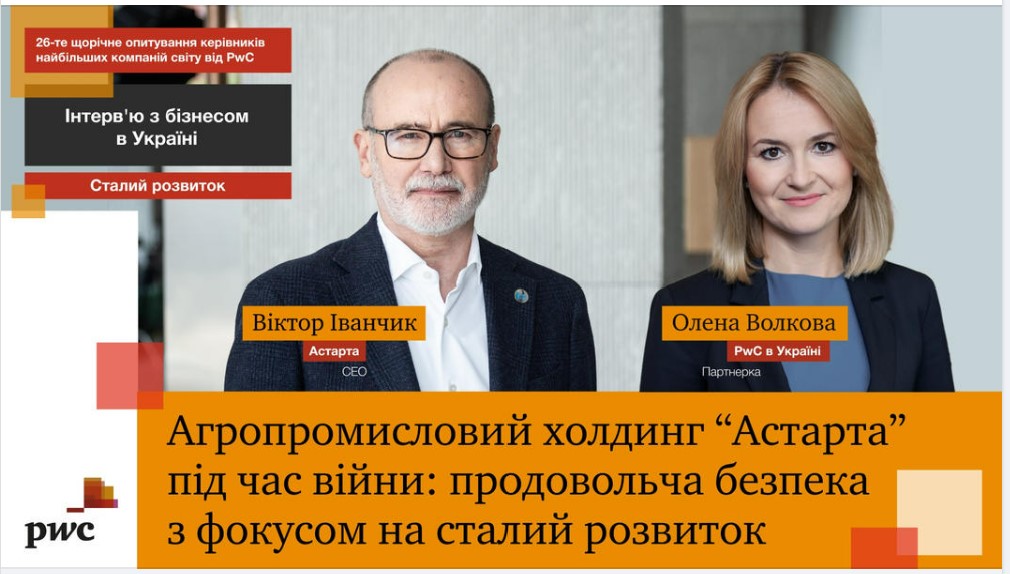
“During the two years of the full-scale invasion, Ukrainian farmers have had to go through significant challenges. Amidst the ever-changing economic environment, the Ukrainian agro-industrial complex faces complex challenges daily, finds optimal solutions, and quickly adapts to the new reality of falling commodity prices and declining exports. Each of these wartime challenges threatens the country’s food security.
However, Ukrainian farmers continue to make significant progress despite the tough conditions. In particular, Astarta-Kyiv agro-industrial holding increased its milk sales by 13% in 2023. The company completed the sugar production season with the best results in the last five years. At the same time, the amount of taxes paid in 2023 is 22% higher than in the previous year.
In addition to purely business aspects, Astarta pays much attention to sustainable development, particularly the environment. Ms.Olena Volkova, Partner at PwC Ukraine, and Mr.Viktor Ivanchyk, the founder and CEO of Astarta, discussed how the company manages to work successfully in many areas in the current realities.
For me, Mr. Ivanchyk, Astarta is associated primarily with a business that has been successfully implementing and systematically adhering to the principles of sustainable development for many years. That’s why I planned to talk to you more about ESG components, but I want to start our conversation with something else. People are the backbone of any business. What was your response to the full-scale invasion as a socially responsible business and employer of c.7k employees?
I agree that people are the first and foremost priority, and two years of full-scale war have only reinforced this. Undoubtedly, we place particular emphasis on the safety and physical and mental health of our employees. We continue to help hundreds of mobilised employees, veterans and their families, and the Armed Forces of Ukraine. Like any other conscious business in Ukraine, we support those who have lost their livelihoods due to the hostilities. We actively cooperate with communities, build a humanitarian ecosystem, including the development of regional entrepreneurship (grant educational programmes: “Course for Independence”, “Brave”, “Wings”), and the implementation of the “Resilience” programme. The range of these and other initiatives is quite broad and requires constant systematic approaches and updating in line with the challenges. That is why, in March 2022, we created a humanitarian platform. We have engaged international and Ukrainian partners in cooperation, are jointly implementing many projects, and have already assisted over 830,000 Ukrainians in the amount of over UAH 1.07 billion.
I am turning to the issue of sustainable development. I know that Astarta has been paying considerable attention to this area for many years and was once ranked among the top three agricultural leaders in the world by one of the prestigious ESG ratings. You won the UN Global Compact international competition in the SDG Pioneer for Sustainable Business Strategy nomination for your achievements in promoting the Sustainable Development Goals. How has the full-scale war affected Astarta’s ESG strategy? Which (to quote you) is your business philosophy?
Yes, our efforts have been recognised by global ESG rating agencies such as Sustainalytics, Ecovadis, CDP, and UN Global Compact, and our international financial partners. Astarta became the first agricultural company in Ukraine to receive climate-related financing from the EBRD and the Clean Technology Fund during the full-scale war in 2023.
What are the current priorities of the ESG strategy within the company’s operations?
We are focusing on digitalisation, energy independence, automation of all processes, and implementation of advanced technologies and engineering solutions.
With a focus on preserving land resources for future generations, we are moving from traditional practices to precision farming and regenerative agricultural practices, which have already become a global trend. Our in-house IT company, AgriChain, has developed its comprehensive agribusiness management software solution to implement these practices. We started our journey towards climate change adaptation and mitigation with the help of Cool Farm Tool, a specialised software developed by the global scientific community to reduce greenhouse gas emissions in agriculture.
In the food processing sector, our primary focus was increasing the share of renewable energy sources in the energy balance by increasing biogas production and switching from fossil fuels to biomass fuels.
Despite the war, Astarta is increasing its share of alternative energy sources. In particular, in 2023, biogas production increased eight times compared to 2021. Please tell us about your environmental strategy in the medium term.
We closely follow global efforts to combat climate change and are doing our part to address this issue. Last year, we approved the holding’s decarbonisation strategy. Its key elements include scaling up regenerative farming practices, improving energy efficiency and using alternative energy sources.
The measures we plan to implement by 2030 will help improve soil health, reduce fertiliser use and energy consumption in production, and reduce the holding’s greenhouse gas emissions by 44%.
Another project, Sustainable Procurement, which we are currently implementing with our partners, will reduce indirect greenhouse gas emissions (Scope 3) in Astarta’s supply chain.
In light of Ukraine’s active preparation for EU accession, what aspects of sustainable development should Ukrainian companies pay attention to now?
If we are talking about integrating the agricultural sector into the European market, Ukrainian producers must support the goals of the European Green Deal and one of its key components – the Farm-to-Fork strategy.
The F2F strategy aims to change the existing EU food system towards a more sustainable model that has a neutral or positive impact on the environment, helps mitigate and adapt to climate change, halts the loss of biodiversity, and ensures food security, nutrition and public health.
Incorporating these goals and values into the priorities of the Ukrainian government and business is crucial for post-war recovery.
Thank you for the conversation and Astarta’s contribution to our food security. The agricultural sector is holding on – we are holding on!
The source: PwC in Ukraine
